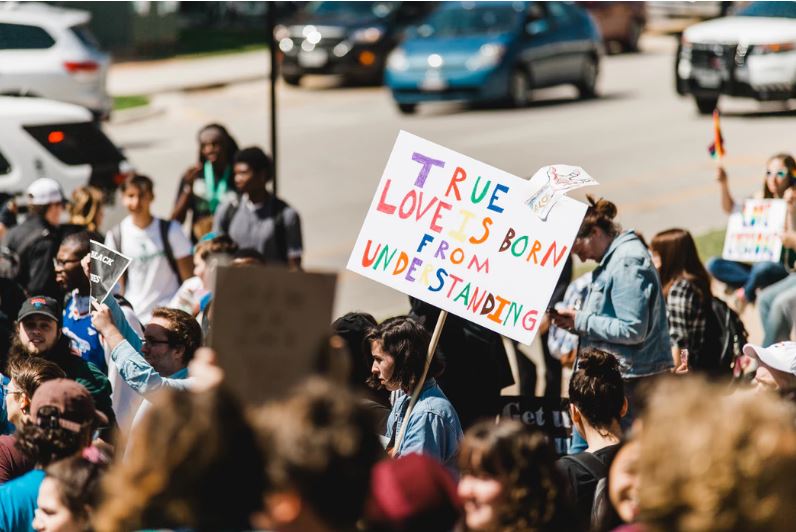Few topics are as divisive today as the topic of illegal immigration. Are those who oppose amnesty and DACA “unspiritual,” “unholy,” and “unloving”? Are those in favor “lawless” and “anti-American”? We have to acknowledge that this is a complex issue that can’t be easily addressed in a short Facebook post or tweet or, for that matter, a single blog post. And we also have to acknowledge that there are good, holy, and righteous people on both sides of the equation. Vilifying one another’s views isn’t helpful and doesn’t bring about the unity Christ expects from His church. That being said, I think it’s important to clear up some misconceptions we encounter daily. As you consider this issue yourself and discuss it with others, use the “Talking Points” and “Questions to Promote Discussion” below.
Talking Points:
There is a difference between legal and illegal immigration
Detractors of current U.S. policies or proposed policies on illegal immigration often argue on social media that “our nation is a nation of immigrants,” which clouds the issue at hand. They are completely correct. But no one I know is against legal immigration (although I admit chain migration and the diversity lottery program are matters of contention, even though they are currently legal). It is illegal immigration that is the central issue, and it’s important to make that clarification at the beginning of any discussion with the opposition. This isn’t an issue of racism, but of law.
Immigration to the U.S.A. is not a “right.”
The United States, like all other countries, has a right to extend or limit immigration, and it has done so repeatedly over the past 200 years. The article, Trends in Migration to the U.S. (from the Population Reference Bureau), gives a brief overview of the changes in our immigration policies through the years and the qualitative and quantitative restrictions that have been enacted. Of note are the Chinese Exclusion Act of 1882, which restricted immigration by country of origin (in this case, China), and the Immigration Act of 1924, which restricted immigration to 2% of the total number of people of each nationality in America as of the 1890 census, which resulted in a decline in foreign-born populations. Quotas based on nationality were ended by 1965. [See U.S. Immigration Before 1965 for additional information.] Interestingly, regarding the Immigration Act of 1924, Wikipedia makes this observation:
The law was primarily aimed at further restricting immigration of Southern Europeans and Eastern Europeans, especially Italians, Slavs and Eastern European Jews.[1][2][3] In addition, it severely restricted the immigration of Africans and banned the immigration of Arabs and Asians.
According to the U.S. Department of State Office of the Historian the purpose of the act was “to preserve the ideal of American homogeneity”.[4] But though the Act aimed at preserving American racial homogeneity, it set no limits on immigration from other countries of the Americas.[5] Congressional opposition was minimal. According to Columbia University historian Mae Ngai, the 1924 Act put an end to a period where the United States essentially had open borders.[6]
The previous qualitative restrictions listed in the 1903 “Act to Regulate the Immigration of Aliens into the United States,” are clear evidence that our policy for well over 100 years has not been to simply allow anyone to enter our country who had a desire to do so. This act, which also recognized that illegal aliens do not have the rights of citizens granted by our Constitution and declared it a crime to assist people to enter the U.S. illegally, was quoted by the Supreme Court in Turner v.Williams in 1904:
Sections 2 and 38 of the Act of March 3, 1903, entitled “An Act to Regulate the Immigration of Aliens into the United States,” 32 Stat. 1213, c. 1012, are as follows:
“SEC. 2. That the following classes of aliens shall be excluded from admission into the United States: all idiots, insane persons, epileptics, and persons who have been insane within five years previous; persons who have had two or more attacks of insanity at any time previously; paupers; persons likely to become a public charge; professional beggars; persons afflicted with a loathsome or with a dangerous contagious disease; persons who have been convicted of a felony or other crime or misdemeanor involving moral turpitude; polygamists, anarchists, or persons who believe in or advocate the overthrow by force or violence of the government of the United States or of all government or of all forms of law, or the assassination of public officials; prostitutes, and persons who procure or attempt to bring in prostitutes or women for the purpose of prostitution; those who have been, within one year from the date of the application for admission to the United States, deported as being under offers, solicitations, promises or agreements to perform labor or service of some kind therein, and also any person whose ticket or passage is paid for with the money of another, or who is assisted by others to come, unless it is affirmatively and satisfactorily shown that such person does not belong to one of the foregoing excluded classes; but this section shall not be held to prevent persons living in the United States from sending for a relative or friend who is not of the foregoing excluded classes…”
So, people who were poor, mentally ill, diseased, felons, polygamists, anarchists and prostitutes were not welcome to immigrate to the United States. They didn’t have a “right” to come here, because, obviously, sovereign nations have the right to determine who can enter a country legally. Ironically, the famous sonnet by Emma Lazarus, “The New Colossus,” was added to the pedestal of the Statue of Liberty in 1903. It reads in part:
“Give me your tired, your poor,
Your huddled masses yearning to breathe free,
The wretched refuse of your teeming shore.
Send these, the homeless, tempest-tost to me,
I lift my lamp beside the golden door!”
The Statue of Liberty itself, of course, has nothing to do with immigration. It’s a commemoration of our independence from Britain. Emma Lazarus was not a politician or representative of the government or the people. She was a poet, and her poem, as stirring as it is, does not reflect American immigration policies or popular sentiment at the time it was written, and certainly not at the time it was added to the Statue of Liberty. People who quote the poem today as justification for a liberal immigration policy, thinking it reflected the intentions of our country since its inception, are misguided.
So, are we clear on this one? Immigration is a status offered, but not owed. No one has a “right” to come here through either legal or illegal avenues. Immigration has been restricted for well over 100 years, for reasons that will become clear as you read on.
It is not “unloving” to enforce immigration laws.
This is where many well-meaning Christians quote the biblical story of “The Good Samaritan” (Luke 10:25-37) or the Old Testament passages about caring for “the alien among you.” Well, let’s take a look at a biblical example no one is quoting. Hang with me here, because it’s the principle that’s important.
In the New Testament book of Philemon, Paul writes to a prominent member of the Colossian church, named Philemon, about a runaway slave who has also stolen from his master, offenses that were punishable by death in the Roman Empire. Paul encountered the former slave, Onesimus, in Rome and led him to faith in Jesus. Though Onesimus is now a Christian, according to Roman law, he is still legally Philemon’s property. In his letter, Paul tells Philemon about Onesiumus’ conversion and offers to repay Philemon for the stolen property. He expresses his hope that Philemon will now accept Onesimus as a brother in Christ, which is far better than a slave. Note that Paul mentions in verse 12, “I am sending him – who is my very heart – back to you.”
This is the interesting part. Why would Paul send Onesimus back to where he came from? He hoped Philemon would treat him well, but there was no guarantee. He may very well have been sending Onesimus back to a life of poverty and slavery. After all, there was a reason why Onesimus left in the first place. He wanted freedom. He wanted a different life. And he may have found what he was looking for in Rome. How could Paul force him to return to his former circumstances?
We know it wasn’t because of a lack of love for Onesimus. None of us would accuse the Apostle Paul of being unloving, especially in light of his clear emotion in this short letter to Philemon. Now, let me be very clear. Paul is not advocating slavery in this letter, and neither am I! In fact, this letter laid the groundwork for the abolishment of slavery. It is clear that Paul appeals to the brotherhood of human beings and Christians above property laws. But still, he respects the law, even if it feels unjust. Paul’s faith and Christian principles demanded that he do what is right and trust God to do the rest.
The point is this: It is not unloving to enforce immigration laws, even when to do so means leaving (or returning) hurting people to oppressive environments. That doesn’t mean we shouldn’t advocate for better laws, it just means we should enforce the laws we do have. Making excuses for illegal immigration because of a person’s dire situation, thereby circumventing the law, is not a righteous or even loving position to take.
The following video is one of the best I’ve ever seen in describing the immigration problem as well as the solutions. It’s not feasible to allow everyone in the world who is poor or oppressed to come to the United States. We could never support that! It is not unloving to leave people where they are. However, it is unloving to not go to where they are to help change their situations. We don’t have the option to just ignore them. We need to help, but it is misguided to think the only way to help is to allow them to break our laws and flood into our country. Watch this video now and see how it changes your perception.
God’s directives to individuals don’t necessarily apply to countries.
It’s interesting that Christians on the left side of the political spectrum often criticize those on the right for their “God and country” belief system. They claim that many conservative Christians equate the state with Christianity, so they will, for instance, vote for someone who is a Christian or try to enforce biblical morality on the masses. They believe patriotism and Christianity go hand-in-hand to the point of equating Christianity with Republicanism. This is an oversimplification, of course, but let’s use their logic on them.
The same people (Christians, pastors, etc.) who blame conservatives for equating “God and country” are doing the exact same thing in their defense of illegal immigration. They site loving one’s neighbor, caring for the alien, and uplifting the downtrodden – God’s commands to His people – as rationale for why the government should do these things. Certainly, every Christian should be kind to everyone, regardless of immigration status. We should share food with those in need, tend to their wounds, provide spiritual counsel, etc. But that doesn’t mean we should help them break our country’s laws. That doesn’t mean the government should step in and meet every need of every person who has come here illegally. It doesn’t mean illegal immigrants should get a “pass.” The supporters of illegal immigration will vote for a candidate based solely on their support of this issue because they equate it with Christianity itself. How can anyone be a true Christian and neglect the plight of the illegal immigrant?
Now, I understand that the “government” is a reflection of the values of the governed. But the government’s role is to create laws that protect the general welfare of its citizens, not to engage in compassionate ministry to all the peoples of the world by allowing them to come here. The government’s role is to defend and protect its citizens. When we take admonitions for how we are to treat people personally and apply that to government policies, expecting our government to be a type of church, then we are a bit misguided. I’m not saying our government shouldn’t be involved in sending aid to other countries or in responding to humanitarian crises around the world. I’m just saying that the argument being used by left-leaning Christians is somewhat hypocritical because they fault those on the right for using the same logic.
So, there you have it. These four considerations should be part of any discussion on illegal immigration. My title question was, “Is there a ‘right’ response to the immigration crisis?” I’m not sure if there is a “right” response, but there definitely are some “wrong” responses. And the response that is most wrong is vilifying anyone who doesn’t agree with your perspective. It’s important when you get in debates like this to really listen and for both parties to be logical and not just emotional. Laws are important to the sustainability of civilized cultures. But people are also important. And these two are not mutually exclusive. There are ways to reach out and help people without condoning lawlessness. There are opportunities for compassion and social transformation in people’s native countries. Perhaps if we spent more time trying to change the countries people are desperate to flee than trying to circumvent our country’s laws, we might make more progress and lift multitudes out of poverty and hopelessness.
Questions to Promote Discussion:
- Is it fair to people who followed the correct procedures and have been waiting for years to gain entry to the U.S. when we reward those who came here illegally? What would keep anyone from just coming here and sorting out the paperwork later?
- Does our acceptance of illegal immigrants through sanctuary cities and government programs actually promote the disintegration of families in poor countries? If desperate parents send their children off to another country at great peril, aren’t we somehow complicit in any harm that comes to them when we entice them to do this through our policies and proclamations?
- What do you think would be the outcome if you snuck into Mexico or Germany or Egypt without a visa and then tried to take advantage of government services? Would it be right for you to demand your “rights”?
- How do you feel about illegals demanding rights reserved for citizens while waving the flag of their country of origin? Shouldn’t respect for our values and laws and allegiance to our country be the starting point for illegal immigrants becoming legal?
- How do you feel about illegal immigrants who commit crimes here? Are not stealing Social Security numbers and falsifying ID and immigration status also crimes? Do you think there is any correlation between breaking laws to get here and continuing to break laws afterward?
- Would you let anyone who was worse off than you come into your home, eat your food, and take your money without gaining your permission first? What if they had a really good reason? How would you feel if it was your neighbor who gave them access to your bank account information because she knew you had money to spare?
If you liked this article, you might also enjoy…








